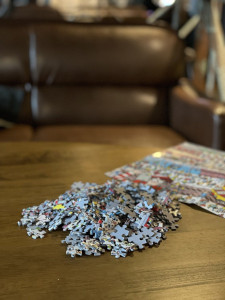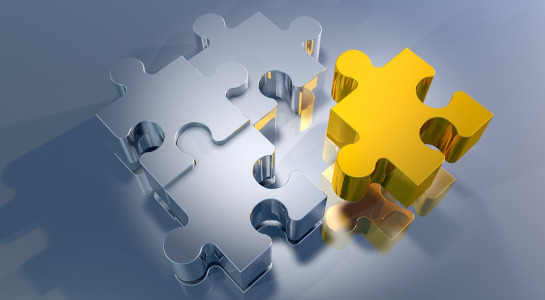
Speed puzzling mental prep is real? Definitely! And I always share how to get ready for speed puzzling as the first time at a puzzling competition will be an experience like no other. It doesn’t stop there, every competition needs speed puzzling mental prep.
The exciting world of Speed Puzzling awaits! The mental preparation and physical prep is your trusty companion on this exhilarating journey! There is no reason to shy away from the opportunity, but before you actually start your jigsaw puzzle, you need to be ready.
Gearing up to tackle puzzles with lightning speed, take a moment to nurture your mind and prime it for the challenges ahead. Picture yourself in a serene mental paradise, where focus is sharp, the beauty goes on forever, your concentration is unwavering, and puzzle-solving prowess knows no bounds. Now look up and see the puzzle you are about to complete.
Table of Contents
A Mental Focus Win Helps Your Game
Looking back on my fast jigsaw journey, the speed puzzling mental prep was one of the biggest ways I felt I had an advantage of playing a jigsaw puzzle fast. I needed speed puzzling tips and knowledge to be confident! I came from a lazy, Sunday afternoon jigsaw puzzle place. Then threw myself into this fast, fun loving puzzle competition where you sweat when you find yourself getting focused!
Mental rehearsal is a crucial aspect of preparing for speed puzzling, as it allows you to visualize the process, anticipate challenges, and fine-tune your strategy. I call it my training session for a great time. If you think you just go out and play puzzles, think again. Your mind needs to be in the right frame of mind.
Here’s a step-by-step guide on how to mentally rehearse and get ready to jigsaw fast:
1. Understand the Puzzle so Study the Image.
Begin by thoroughly studying the image of the puzzle you’ll be working on. Familiarize yourself with key details, colors, patterns, and distinct features. Understanding the overall picture enhances your mental map of the puzzle.
2. Break Down the Puzzle to Identify Sections.
Mentally divide the puzzle into manageable sections. Recognize areas where patterns or distinctive elements can guide your approach. This segmentation helps organize your mental strategy and allows for more efficient problem-solving.
3. Visualize the Starting Point and Imagine the First Moves.
Close your eyes and visualize yourself starting the puzzle. Picture the initial placement of edge pieces and the foundational steps you’ll take. This mental rehearsal sets the tone for a confident and focused beginning.
4. Anticipate Challenges and Envision Difficult Sections.
Identify potential challenges within the puzzle, such as complex patterns, subtle color variations, or intricate details. Visualize how you will approach and overcome these challenges during the actual speed puzzling session.
5. Practice Rotating the Puzzle Using the Dynamic Mental Rotation.
Imagine yourself rotating the puzzle regularly to gain different perspectives. Visualize how this dynamic approach will help you identify connections, patterns, and potential matches more effectively.
6. Utilize Peripheral Vision to Expand Your Mental Visual Field.
Train your mind to use peripheral vision even in the mental rehearsal. Envision keeping track of multiple puzzle sections simultaneously, emphasizing the importance of a broad and adaptive visual approach. This speed puzzling mental prep is the most important step for me as I work my puzzle.
7. Set Completion Milestones with Mental Completion Steps.
Break down the puzzle into mental milestones. Visualize reaching each milestone, assembling sections, and gradually progressing towards completing the entire puzzle. This step-by-step mental roadmap boosts confidence and keeps you focused.
8. Practice Time Management to Mentally Simulate Time Constraints.
Introduce time constraints into your mental rehearsal. Visualize solving the puzzle efficiently within the allocated time, making quick decisions, and maintaining a steady pace. If you have a speed puzzling mental prep plan in place, you already know you need to think one or two pieces ahead.
9. Cultivate Emotional Resilience for Positive Visualization.
Envision yourself maintaining composure and resilience, even if you encounter challenging moments. Cultivate a positive mindset, visualizing successful problem-solving and adaptability throughout the speed puzzling session.
10. Incorporate Breathing Techniques for Mental Breathing Integration.
Integrate controlled breathing into your mental rehearsal. Visualize taking deep breaths during challenging moments, using breath as a tool to stay calm and focused.
11. Reflect on Past Success for Positive Recall.
Reflect on past speed puzzling successes. Visualize instances where you efficiently connected pieces, navigated challenging sections, and achieved your goals. This positive recall reinforces your confidence and primes your mind for success.
12. Repeat and Refine for Consistent Mental Practice.
Engage in regular mental rehearsal sessions leading up to the speed puzzling event. Repetition refines your mental strategy, making it more automatic and enhancing your readiness for the actual competition.
I Use These Speed Puzzling Mental Prep Steps Before Every Competition

I’ve been there, touched the jigsaw puzzle pieces and know you need to have some speed puzzling mental prep for a good showing. Like with anything you do well, it’s important to consider how you can do your best by breaking down the steps. Hopefully this will help you, like it did me.
Remember by incorporating these steps into your mental rehearsal routine, you’ll develop a comprehensive and strategic mindset that prepares you for the fast-paced challenges of speed puzzling. Visualization, when done consistently, can significantly contribute to improved performance and overall success in speed puzzling competitions.
